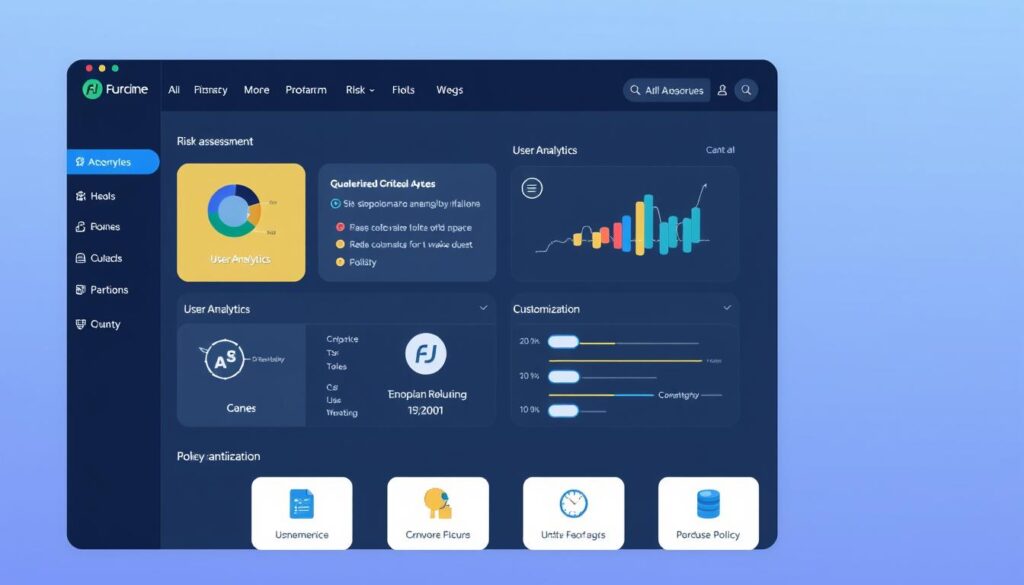The insurance sector stands at a technological inflection point, driven by innovations that are fundamentally altering traditional operations. As we move into 2025, technologies like artificial intelligence and blockchain are reshaping business models.
We’re witnessing a revolutionary transformation in the insurance landscape, creating new opportunities for operational efficiency, customer engagement, and risk management. At CoWrit Technologies Inc, we’ve observed how these innovations are creating both challenges and opportunities for insurance providers.
Key Takeaways
- The insurance industry is experiencing unprecedented change driven by technological advancements.
- Emerging technologies are enhancing existing processes and altering how insurance companies operate.
- Understanding these trends is essential for strategic planning and maintaining a competitive advantage.
- Technologies like AI and blockchain are making significant impacts on the industry.
- Insurance professionals must navigate this changing landscape to stay competitive.
The Evolving Insurance Landscape in 2025
The insurance industry is on the cusp of a significant transformation in 2025, driven by technological advancements and changing consumer expectations. As we navigate this shift, it’s essential to understand the current state of the industry and the key drivers behind this change.
Current State of the Insurance Industry
The insurance industry is currently undergoing a period of significant upheaval, driven by the need for innovation and adaptability. With the help of artificial intelligence, insurers can now analyze vast amounts of data from various sources, including social media and IoT devices, to improve risk assessments and offer more accurate premiums.
For instance, AI can collect data on driving behavior, enabling insurers to price auto insurance more fairly. This level of personalization is becoming increasingly important in the insurance sector.
Key Drivers of Transformation
Several factors are driving the transformation in the insurance industry. Some of the key drivers include:
- The proliferation of connected devices and IoT sensors, generating real-time data for more accurate risk assessment.
- Changing customer expectations, pushing insurers to develop more intuitive and personalized experiences.
- Economic pressures and increased competition, forcing insurance companies to seek operational efficiencies.
Additionally, regulatory changes and the rise of insurtech startups are also playing a crucial role in shaping the industry’s future. As the industry continues to evolve, insurers must be prepared to adapt to these changes and capitalize on emerging trends.
2025 Insurance Trends: AI, Blockchain & Smart Policies
We’re seeing a new era in insurance emerging in 2025, characterized by the integration of AI, blockchain, and smart policies. This transformation is not just about adopting new technologies; it’s about revolutionizing the way insurance companies operate and interact with their customers.
Artificial Intelligence Reshaping Insurance Operations
Artificial intelligence is significantly impacting insurance operations by enhancing customer experience and streamlining processes. AI-powered systems can analyze vast amounts of data to identify patterns and predict risks more accurately.
This enables insurers to develop more precise policy offerings tailored to individual needs. For instance, AI-driven chatbots are being used to provide 24/7 customer services, improving response times and customer satisfaction.
Blockchain Technology for Enhanced Transparency
Blockchain technology is bringing a new level of transparency to the insurance industry. By utilizing a decentralized ledger, insurers can ensure that data related to policies and claims is secure and tamper-proof.
This not only helps in reducing fraud but also enhances trust between insurers and their customers. For example, blockchain can be used to create smart contracts that automatically trigger payouts when predefined conditions are met, making the claims process more efficient.
Smart Policies and Personalized Coverage
Smart policies are revolutionizing the way insurance products are designed and consumed. By leveraging real-time data from connected devices, insurers can offer personalized coverage that adjusts dynamically based on actual risk exposure.
This approach not only benefits customers by providing more relevant coverage but also helps insurers by reducing the risk of adverse selection. For more insights on how technology is transforming industries, you can visit https://fasbees.net/best-anti-aging-skincare-products-tips-for-2024/.
| Trend | Description | Benefit |
|---|---|---|
| AI in Insurance | AI enhances customer experience and operational efficiency | Improved customer satisfaction and reduced costs |
| Blockchain | Blockchain increases transparency and security | Reduced fraud and enhanced trust |
| Smart Policies | Smart policies offer personalized coverage and dynamic adjustments | Better alignment of coverage with actual risk |

As we move forward, it’s clear that these technologies will continue to shape the insurance landscape, offering new opportunities for growth and innovation.
AI-Powered Innovations Transforming Insurance
The insurance industry is on the cusp of a revolution, driven by AI-powered innovations that are transforming traditional practices.
Advanced Underwriting and Risk Assessment

AI underwriting insurance software is revolutionizing the way insurers assess risk. By analyzing vast amounts of data, these systems can provide more accurate risk assessments, enabling insurers to make informed decisions.
Automated Claims Processing
Automated claims processing is another area where AI is making a significant impact. By streamlining the claims process, insurers can reduce processing times and improve customer satisfaction. AI-powered systems can quickly assess claims, identify potential fraud, and route complex claims to human adjusters.
Predictive Analytics for Risk Management
Predictive analytics is transforming risk management in 2025 by enabling insurers to forecast potential loss events before they occur. AI-powered predictive models use historical data and trends to predict various scenarios, from individual customer behaviors to large-scale events like natural disasters.
Some key applications of predictive analytics include:
- Sophisticated catastrophe modeling that combines historical data with climate science to predict natural disaster patterns.
- Behavioral predictive models that identify policyholders most likely to file claims in the near future.
- Risk accumulation analysis powered by AI to understand total exposure across geographic regions and coverage types.
- Using predictive insights to optimize product portfolios and identify areas of growth potential and profitability.
By leveraging these advanced analytics capabilities, insurers can develop more effective risk management strategies, improving their resilience and profitability. As AI algorithms continue to improve, predictive analytics will play an increasingly critical role in helping insurers stay ahead of emerging risks.
For more information on how technology is transforming various industries, visit our luxury fashion marketplace.
Blockchain Applications in the Insurance Sector
As we move into 2025, blockchain technology is playing a crucial role in reshaping the insurance landscape. This technology is not only enhancing security but also improving transparency and efficiency across various insurance operations.
Smart Contracts and Policy Automation
Blockchain’s smart contracts are automating policy issuance and claims processing, reducing the need for intermediaries and increasing the speed of transactions. This automation is achieved through self-executing contracts with the terms of the agreement written directly into lines of code.
Fraud Detection and Prevention
Blockchain technology is being utilized to detect and prevent fraud in the insurance sector. By creating an immutable record of claims and transactions, insurers can identify suspicious patterns and prevent fraudulent activities. This not only reduces financial losses but also enhances customer trust.
Secure Data Sharing Between Stakeholders
Blockchain is enabling secure data sharing between insurance stakeholders, creating trusted networks where information can be exchanged without compromising security or competitive advantage. Key benefits include:
- Permission-based blockchain systems for controlled data access
- Streamlined compliance reporting through verifiable data access
- Efficient claims handling with simultaneous access to verified information
- Enhanced customer privacy through cryptographic techniques
- New forms of data monetization through selective data sharing
- Reduced administrative costs and improved data accuracy
By leveraging blockchain, insurers can improve cybersecurity, reduce risk, and ensure compliance with regulatory requirements. As the insurance industry continues to evolve, the integration of blockchain technology is expected to play a pivotal role in shaping its future.
Customer Experience Revolution Through Technology
Customer experience in insurance is undergoing a radical transformation, thanks to cutting-edge technologies. We’re seeing a significant shift in how insurers interact with their customers, making the experience more personalized and efficient.
24/7 AI-Powered Customer Service
AI-powered customer service is available 24/7, providing immediate assistance to customers. This not only enhances customer satisfaction but also reduces the workload for human customer service agents, allowing them to focus on more complex issues.
IoT Integration for Usage-Based Insurance

IoT devices are being used for insurance monitoring, enabling usage-based insurance. This allows insurers to offer more personalized policies based on actual usage data, potentially lowering premiums for customers who demonstrate safe behaviors.
Digital Platforms and Insurance Ecosystems
Leading insurers have established sophisticated digital platforms that integrate multiple service providers. These ecosystems extend beyond traditional insurance offerings, incorporating wellness programs, financial advisory services, and risk management tools. By creating comprehensive insurance ecosystems, insurers strengthen their market positioning while generating additional revenue streams through innovative business models.
For more insights on the future of insurance customer experience, visit our article on The State of Insurance in 2025: Customer Experience as a New.
Conclusion: Preparing for the Future of Insurance
The future of insurance is being rewritten by technologies like AI and blockchain. As we’ve explored throughout this article, these innovations are fundamentally reshaping insurance operations, from underwriting and claims processing to customer service and risk management.
To stay competitive, insurers must strategically adopt these technologies with clear business objectives. This involves investing in digital capabilities and data literacy across their workforce. Regulatory compliance will remain a critical consideration as new technologies raise questions about data privacy and consumer protection.
At CoWrit Technologies Inc, we help insurance companies navigate this changing landscape through our expertise in AI Generative Applications and Digital Marketing services. We encourage insurance leaders to begin their transformation journey today by identifying high-impact use cases for these technologies and developing strategic implementation roadmaps. For assistance, contact our team via WhatsApp at +44-7822010953.


